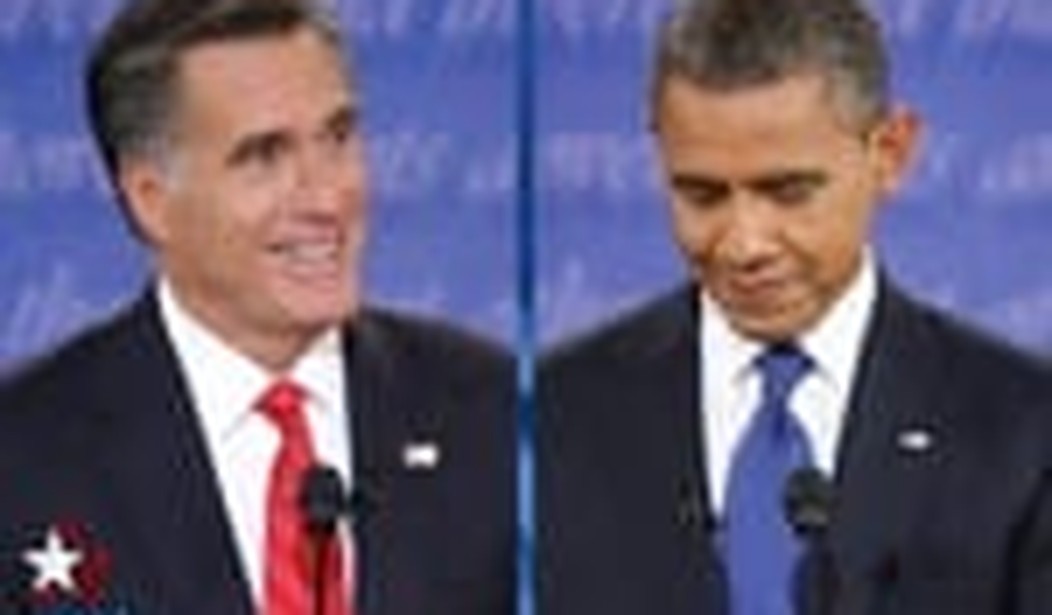In the very best postmodern fashion, Obama and his supporters have relied on a narrative about Obama that has been carefully constructed. He’s brilliant, a great writer, a rare thinker, a moderate, a first-class temperament with neatly pressed pants, a uniter, a cool guy who’s unflappable.
The first debate last Wednesday threatened to make that narrative seem absurd. You might say that the narrative got mugged by reality, and an awful lot of people were watching while it happened.
But the next day there was a new narrative in place — or rather, several narratives: Romney cheated, the altitude was too high for Obama, he didn’t have time to practice because he was too busy with weighty matters, Romney lied, and look at those great unemployment numbers!
Those numbers themselves are another narrative, one that no one can quite figure out because there’s a disparity between one part of the stats and other parts. In a very real sense, the numbers don’t seem to add up. But they’re good for the Obama narrative, unless you think too deeply about them.
But one of the points of a narrative is not to think too deeply about it.
Now in a sense every candidate spins a narrative about him/herself, and the media spins a narrative of its own which is either in agreement or disagreement with that candidate’s preferred narrative. But Barack Obama is the first presidential candidate I can think of — be they liberal or conservative, Democrat or Republican, someone I have liked and supported or someone I have detested and opposed — who is nearly all about the narrative, and who seems so aware of it (“I serve as a blank screen on which people of vastly different political stripes project their own views”).
Obama is not only aware of it. He exploits it:
Run-of-the-mill politicians try to hide their duplicity. Only the most gifted of that profession brag that they intend to confound and confuse the public. Such an effort is beyond ingenious; it is brazenly ingenuous.
Obama is sui generis in American presidents, and I’m not referring to the fact that he’s the first black president. That’s irrelevant to this issue, except as another narrative for Obama to exploit. No, his uniqueness is something quite different and involves his unprecedented ability to convince vast numbers of people that he is whatever they wish him to be.
Andrew Klavan calls Obama “an imaginary man.” This is of course not meant literally; Obama is an actual man made of flesh and blood. Klavan is instead referring to what he calls Obama’s “make-believe greatness.” And Bill Clinton, a man you may not admire but who’s smart as a whip, recognized this about Obama way back during the 2008 campaign, as well as acknowledging the media’s complicity in the construction of Obama’s narrative. Bill was plenty annoyed when he himself, as well as his wife Hillary, became the target of it.
Remember this?:
That seems so long ago, doesn’t it? But the Obama fairy tale remains in place for an awful lot of people — and in the ensuing years, Bill Clinton has (seemingly happily) taken on a supporting role in the narrative.
In a way we can see this election as a test of whether America has become tired of the narrative, or whether it wishes to stay in dreamland. Obama has woven the spell himself, aided and abetted by his supporters and mentors and admirers, both in the media and elsewhere.
Some time ago I likened the process of possible disillusionment with Obama as similar to falling out of love. We idealize the love object, as in a fairy tale. In a fairy tale the lovers live happily ever after. But real life can be a little more like another tale of dreams and fairies, that of Titania and Bottom in Shakespeare’s A Midsummer Night’s Dream.
You may remember the plot. Titania, queen of the fairies, has been placed under a spell by Oberon with the help of the mischievous Puck. It has caused her to fall in love with a cloddish man named Bottom, who has in turn been placed under a spell that has turned his head into that of an ass. Later on she receives the antidote that magically undoes the spell. Looking at the creature she formerly adored, she is now not only repelled, she wonders how it was that she could have ever been so thoroughly fooled:
TITANIA
My Oberon! what visions have I seen!
Methought I was enamour’d of an ass.
OBERON
There lies your love.
TITANIA
How came these things to pass?
O, how mine eyes do loathe his visage now!
We in this country have had many kinds of presidents, good and bad, beloved and detested. But have we ever before had a president whose career and persona have been based to such an enormous extent on a carefully constructed narrative that in turn rests on weaving a spell over a charmed public? And was the antidote finally administered last Wednesday night, at the hands of that not-so-very-Puckish guy, Mitt Romney?
For some people, perhaps — but for enough of them to make a difference come this November 6th?









Join the conversation as a VIP Member